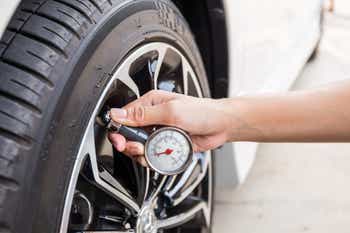Every daily commuter or weekend warrior knows that keeping your vehicle in good running condition is an important part of car ownership. After all, significant repairs can cost a pretty penny. Fortunately, basic maintenance can help keep your expenses down and your wheels on the road instead of in the shop. In this blog, we’ll go over why car maintenance matters, how to budget for it, and five tips to save money and keep your car in good condition.
Why Car Maintenance Matters for Your Budget
Taking care of your car might seem like an extra chore, but it’s actually one of the best ways to save money in the long run. Regular maintenance, like oil changes, tire rotations, and replacing air filters, might cost a little upfront, but it’s nothing compared to the expensive repairs you could face if you skip them.
For example, if you skip something as simple as an oil change, you could end up with engine damage that costs thousands of dollars to fix. If you don’t rotate your tires or check their pressure, they can wear unevenly, cause blowouts, or need to be replaced sooner than expected. These bigger repairs add up quickly and can take a serious toll on your budget.
Additionally, setting aside money for routine maintenance keeps your car running safely and efficiently for longer. The longer your car lasts, the less money you’ll spend replacing it.
How Much to Budget for Car Maintenance
So, how much should you budget for car maintenance? Experian suggests setting aside about $100 per month (or $1,200 per year) for routine maintenance and unexpected repairs. However, the exact answer depends on several factors, including your car’s mileage, age, and your driving habits.
If your car is newer and well-maintained, your annual maintenance costs will likely be lower. On the other hand, older vehicles or cars with high mileage usually require more attention, from brake replacements to timing belt repairs. Your driving habits also play a role. If you’re frequently stuck in stop-and-go traffic or driving long distances, your car might need more frequent servicing.
To stay prepared, consider setting up two budgets: one for regular maintenance and another for emergencies. That way, you’ll always be ready for both the predictable and the unexpected.
5 Essential Car Maintenance Tips to Save Money
Consider these automotive maintenance tips below to learn how to take care of your car while saving money in the process:
1. Keep Up with Routine Oil Changes
When it comes to cheap car maintenance, routine oil changes are one of the smartest, most affordable things you can do for your vehicle. It reduces friction, keeps parts moving smoothly, and prevents overheating. Skipping oil changes can lead to dirty, degraded oil, which puts extra strain on your engine and can cause expensive damage down the road.
Be sure to check your oil regularly and follow your vehicle manufacturer’s recommendations for how often to change it. When it’s time for an oil change, many auto shops offer budget-friendly deals, and there are usually coupons available to help you save even more.
2. Monitor Tire Pressure and Tread Wear
Proper tire maintenance can help you avoid accidents, extend the life of your tires, and even improve your car’s gas mileage. Here are some things you should do to ensure your tires stay in good condition:
- Check tire pressure regularly: Properly inflated tires provide better handling, fuel efficiency, and safety, so make sure Use a reliable tire pressure gauge to check your tire pressure at least once a month and before long trips. Refer to your vehicle’s manual or the sticker inside the driver’s side door for the recommended pressure levels.
- Inspect tread depth: Tires with worn-out tread can struggle to grip the road, especially in wet or slippery conditions, which is a serious safety risk. An easy way to check is the "penny test,” in which you insert a penny into the tread grooves with Lincoln’s head upside down. If you can see the top of his head, it’s time for new tires.
- Rotate tires: Rotating your tires every 5,000 to 7,500 miles (or as recommended by your manufacturer) promotes wear, helping them last longer and reducing overall car upkeep costs.
3. Stay on Top of Battery and Engine Maintenance
Without a functioning battery and engine, your car simply won’t go anywhere, so you want to make sure you give them the care they need to stay in working condition.
When it comes to the battery, regularly check for corrosion on the terminals and clean them with a mixture of baking soda and water if needed. Also, make sure your battery is securely fastened and not loose since vibrations can shorten its lifespan. Most batteries last about three to five years, so if yours is getting up there in age, get it tested to see if it can still reliably hold a charge.
As far as the engine goes, don’t ignore the check engine light. It indicates that something may be wrong with the vehicle and registers an error code sent from the vehicle’s computer. The problem may be as small as a loose gas cap or a misfiring spark plug but can also mean a more serious issue with the electrical system, engine functionality, or emissions. Procrastinating could lead to costly repairs, so it’s smart to get your vehicle looked at sooner rather than later.
4. Replace Air Filters and Spark Plugs as Needed
Replacing small components like air filters and spark plugs is one of the simplest ways to keep your car running efficiently and avoid unnecessary expenses.
A clean air filter helps your engine breathe better by providing a steady flow of clean air. When your air filter is clogged or dirty, your engine has to work harder, which can reduce fuel efficiency and overall performance. Generally, you should replace your filter every 12,000 to 15,000 miles, but refer to your owner’s manual for specific intervals.
On the other hand, spark plugs keep your engine firing properly. Worn-out or faulty spark plugs can cause engine misfires, rough idling, and even reduced fuel economy. Depending on your vehicle, you should replace your spark plugs every 30,000 to 100,000 miles to keep your ignition running smoothly and your car performing at its best.
5. Use Preventative Maintenance to Save on Auto Repairs
Preventative maintenance means catching small issues before they turn into big, expensive problems. One of the ways you can do this is by taking your car in for routine inspections or sticking to your manufacturer’s maintenance schedule. You’ll be able to catch things early, like fluid leaks, worn brake pads, or a failing battery, before they lead to costly breakdowns.
It’s also helpful to know when you can do it yourself and when it’s better to call in a pro. Some tasks, like replacing windshield wipers, topping off fluids, or checking your tire pressure, are easy to do at home and help you save on auto repair costs. But for more complex issues, like engine diagnostics or brake replacements, visiting a trusted mechanic is your best bet. Trying to DIY major repairs without the right tools or expertise could end up costing you more in the long run.
Finding Ways to Reduce Car Maintenance Costs
Car ownership comes with its fair share of expenses, but there are plenty of ways to offset your overall car costs, like taking advantage of cheap auto insurance and auto insurance discounts.
Many insurance providers offer discounts, from safe driver discounts to bundling your home and auto insurance. Some companies also reward low-mileage drivers or provide discounts for installing safety features like anti-theft devices. It’s worth calling your provider to see what options are available because these savings can add up fast.
If you’re shopping around for new coverage, make sure to compare policies to find the best balance between price and coverage. Cheap auto insurance doesn’t mean you have to sacrifice quality. Look for a policy that offers the protection you need at a price that fits your budget. Pay attention to deductible amounts, coverage limits, and any perks like roadside assistance.
Conclusion
Owning a vehicle can be expensive, but if you properly maintain your car, you can help minimize large repair bills, time, and stress. The key is planning ahead. Setting up a simple car maintenance budget helps you stay prepared for routine upkeep and any surprises that pop up. Ultimately, it gives you peace of mind and keeps your finances on track.
You also want to ensure you have reliable auto insurance if something happens on the road. Mercury provides high-quality insurance at an affordable rate, as well as various discounts to help you save even more.


